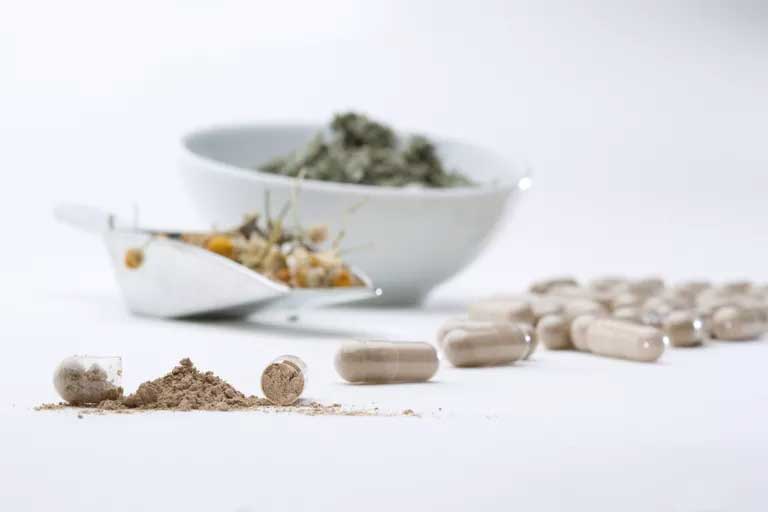Natural Remedies for IBS
At times, it can be challenging to get your irritable bowel syndrome (IBS) under control. You may find it helpful to learn about some herbs and other natural remedies thought to be good for digestive symptoms.
As compared with prescription medication, herbal remedies offer the potential benefits of fewer side effects and concerns about the safety of long-term use.
However, prescription medications have to undergo rigorous safety testing before being made available to the general public. This offers research-documented information regarding safety and effectiveness, something that is sorely lacking for most herbal remedies.
Before trying any herbal supplement, speak with your doctor to ensure that it will not interact with any medications you are taking or cause problems due to an underlying medical condition, including kidney or liver disease.
Herbs for Digestive Health
These herbs are thought to improve overall digestive health. They are indicated for use regardless of IBS sub-type (constipation-predominant, diarrhea-predominant, or alternating-type).
Peppermint Oil
Peppermint oil is the only herbal supplement to get the seal of approval from the American College of Gastroenterology due to its effectiveness in reducing abdominal pain.1
This pain-relieving quality is thought to be the result of peppermint oil’s effect on gut motility. Peppermint oil appears to relax the muscles of the gut. This can reduce the muscle spasms that contribute to abdominal pain.
Slippery Elm
Slippery elm has a long history of use by Native Americans as a remedy for a variety of health conditions. In terms of digestive health, slippery elm is thought to calm irritation by coating the lining of the intestinal system.2
Slippery elm’s effect on the stool illustrates why it is seen as helpful regardless of one’s predominant IBS symptom. By adding bulk to the stool, it is thought to ease diarrhea. Slippery elm also softens the stool, thus helping ease constipation.
Artichoke Leaf Extract
A newer natural remedy to the IBS treatment list, artichoke leaf extract (ALE) shows some surprising promise.
In a 2016 meta-analysis, various studies indicate that it is effective in reducing bowel movements from regular constipation and diarrhea down to “normal.”3 This is believed to be due to a certain antispasmodic compound called cynaropicrin.
Aloe Vera
Aloe vera juice is often marketed as a remedy for IBS. However, the limited research that exists on the subject is contradictory.
Some studies have shown it to have no effects on IBS symptoms. At least one double-blind randomized clinical trial trial found it to effective in constipation, but not abdominal pain. There is still much debate and more research is needed.3
Aloe vera can cause a drop in blood sugar (hypoglycemia) and needs to be used with caution in people on diabetes medications.
Herbs for Constipation
Some herbs and herbal preparations are considered effective in treating constipation because they have a laxative effect. Among them:
- Amalaki is the fruit of the Amalaki tree is found throughout Asia and used often in Ayurvedic medicine. It is thought to positively affect overall digestion and serve as a laxative.
- Triphala is an herbal preparation made the fruit of the bibhataki, haritaki, and Amalaki trees. In addition to its laxative effect, Triphala is thought to reduce abdominal pain and bloating.4
- Herbal stimulant laxatives contain substances called anthraquinones are used as stimulant laxatives. Examples of these include senna, cascara, rhubarb, and frangula.
Anthraquinone herbal laxatives should not be used for more than seven days as their extended use may increase the risk of liver toxicity and damage.
Herbs for Diarrhea
Certain herbs have been associated with a quieting of diarrhea symptoms. Among them:
- Chamomile, available in tea, liquid or capsule form, is thought to reduce inflammation and quiet spasms in the gut.5 Chamomile is not appropriate for anyone following a low-FODMAP diet.
- Berry leaf teas, including those made from blueberry, blackberry, or raspberry leaves, contain tannins which may decrease inflammation and the secretion of fluids in the intestines.
Important Notice: This article was originally published at www.verywellhealth.com by Barbara Bolen, PhD where all credits are due. Medically reviewed by Priyanka Chugh, MD.
The watching, interacting, and participation of any kind with anything on this page does not constitute or initiate a doctor-patient relationship with Dr. Farrah®. None of the statements here have been evaluated by the Food and Drug Administration (FDA). The products of Dr. Farrah® are not intended to diagnose, treat, cure, or prevent any disease. The information being provided should only be considered for education and entertainment purposes only. If you feel that anything you see or hear may be of value to you on this page or on any other medium of any kind associated with, showing, or quoting anything relating to Dr. Farrah® in any way at any time, you are encouraged to and agree to consult with a licensed healthcare professional in your area to discuss it. If you feel that you’re having a healthcare emergency, seek medical attention immediately. The views expressed here are simply either the views and opinions of Dr. Farrah® or others appearing and are protected under the first amendment.
Dr. Farrah® is a highly experienced Licensed Medical Doctor certified in evidence-based clinical nutrition, not some enthusiast, formulator, or medium promoting the wild and unrestrained use of nutrition products for health issues without clinical experience and scientific evidence of therapeutic benefit. Dr. Farrah® has personally and keenly studied everything she recommends, and more importantly, she’s closely observed the reactions and results in a clinical setting countless times over the course of her career involving the treatment of over 150,000 patients.
Dr. Farrah® promotes evidence-based natural approaches to health, which means integrating her individual scientific and clinical expertise with the best available external clinical evidence from systematic research. By individual clinical expertise, I refer to the proficiency and judgment that individual clinicians acquire through clinical experience and clinical practice.
Dr. Farrah® does not make any representation or warranties with respect to the accuracy, applicability, fitness, or completeness of any multimedia content provided. Dr. Farrah® does not warrant the performance, effectiveness, or applicability of any sites listed, linked, or referenced to, in, or by any multimedia content.
To be clear, the multimedia content is not intended to be a substitute for professional medical advice, diagnosis, or treatment. Always seek the advice of your physician or other qualified health providers with any questions you may have regarding a medical condition. Never disregard professional medical advice or delay in seeking it because of something you have read or seen in any website, video, image, or media of any kind.
Dr. Farrah® hereby disclaims any and all liability to any party for any direct, indirect, implied, punitive, special, incidental, or other consequential damages arising directly or indirectly from any use of the content, which is provided as is, and without warranties.


